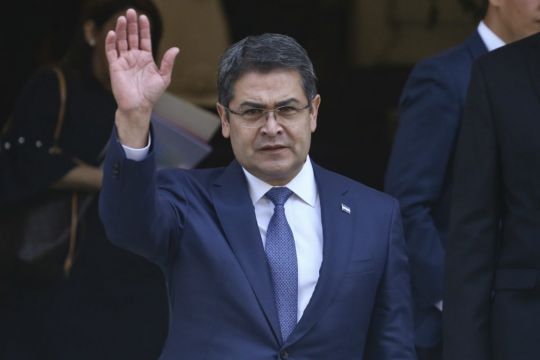The US has formally requested the arrest and extradition from Honduras of former president Juan Orlando Hernandez less than three weeks after he left office.
Honduran security forces surrounded his neighbourhood on Monday night and the Supreme Court of Justice scheduled an urgent meeting on Tuesday morning to select a judge to handle the extradition request.
In a video released by Hernandez’s legal team apparently from inside his home, lawyer Felix Avila said everything would have to wait until the Supreme Court designated a judge to consider the case. “Meanwhile, it is understood that no arrest order exists.”
However, at a police barrier to the neighbourhood, Rasel Tome, vice president of the newly elected National Congress, said Hernandez had to turn himself in or he would be captured.
Shortly before that deadline, Hernandez released an audio recording on Twitter thanking those praying for him.
“It is not an easy moment,” he said. “I don’t desire it for anyone.”

He said the National Police had already been informed by his lawyers that “I am ready and prepared to co-operate and go voluntarily with their accompaniment in the moment the judge designated by the honourable Supreme Court of Justice decides it, to be able to face this situation and defend myself.”
It was a long-awaited fall for a leader reviled in his home country, who enjoyed support from the Trump administration but had been kept at arm’s length by a Biden White House targeting Central America’s endemic corruption as a root cause of migration.
The specific charges Hernandez’s faces are not known, but federal prosecutors in New York had previously named him a co-conspirator in a drug trafficking case, alleging that his political rise was fuelled by drug profits. Hernandez has long denied any wrongdoing.
Hernandez left office on January 27 with the swearing in of President Xiomara Castro. The same day he was sworn in as Honduras’s representative to the Central American Parliament.
His lawyer, Hermes Ramirez, told local media his client had immunity as a member of the regional parliament and said government forces were not following proper procedures. He said Hernandez was inside the home.
Various contingents of the National Police, including special forces, as well as military police were present around Hernandez’s neighbourhood on Monday night. Barriers at all of the entrances kept out media and even residents.
Hernandez often pointed to the fact that Honduras began allowing the extradition of Hondurans on drug trafficking charges while he was president of the congress as part of his defence, but US prosecutors have alleged that he was taking bribes from drug traffickers on the promise of protecting them once he was president.
US prosecutors in New York repeatedly implicated him in his brother’s 2019 drug trafficking trial, alleging that his political rise was fuelled by drug profits.
That brother, Juan Antonio “Tony” Hernandez, himself a former Honduran congressman, was sentenced to life in prison on drug and weapons charges in March 2021. At his sentencing assistant US attorney Matthew Laroche characterised the crimes as “state-sponsored drug trafficking”.
Juan Orlando Hernandez took office on January 27 2014. He used a friendly Supreme Court to overcome Honduras’s constitutional ban on re-election and won a second term in 2017 in elections marred by irregularities.







